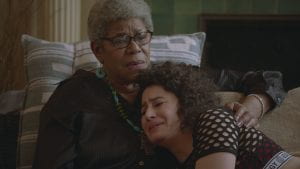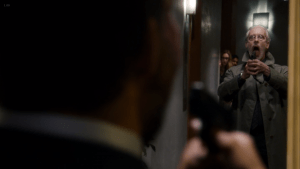Over all of my past blog posts, I’ve mentioned the way in which a given element of New Girl, whether it be cinematography, writing, or thematic explorations, change the way in which the main characters of the show are developed. For this last post, I’d like to dive deeper into how Jess, the focus of the show, is portrayed and how her relationship with the other characters is vital in bridging the gap between the absurd hi-jinks in which they find themselves and the grounded, relatable reality of their friendships.
In the episode “Control” (S1E16), Jess compromises the very structure of the friends’ dynamics when she attempts to, and successfully convinces, Schmidt to stop his borderline germaphobe habits just so he stops nagging her over the cleanliness of the loft. However, by bringing Schmidt’s personality into question, Jess throw both the apartment itself and her friend group into disarray, and she has to spend the rest of the episode undoing her mistake.

Schmidt trades in his business casuals for a drug rug. What has Jess done…
Beyond just creating an entertaining plot, this episode demonstrates the significance each characters’ personality has on the functionality of the show. By directly questioning a core trait of Schmidt’s personality, “Control” acts as a nod to the way in which writers craft a character to fill a particular niche in the show: though pretentious and arrogant, Schmidt’s cleanliness and housekeeping rules balance out the much looser habits and general dispositions of Winston and Nick while also grounding the optimism and spontaneity of Jess. The show works because each character fills a particular archetype, and the interaction between these archetypes contributes to the appeal of the show. Thus, when Jess tries to change the personality of her friend, she is also affecting the very fabric of her friend group and the fundamental appeal each character has to the show’s viewers.
While there are many facets to New Girl that can be analyzed to explain how the show functions, it is ultimately the relationships between the unique and carefully planned characters which lends a special charm to the series.
Netflix. “New Girl S1:E16 ‘Control’.” Online Video Clip. Netflix. Netflix, 2018. Web.
13 Nov. 2018.


















